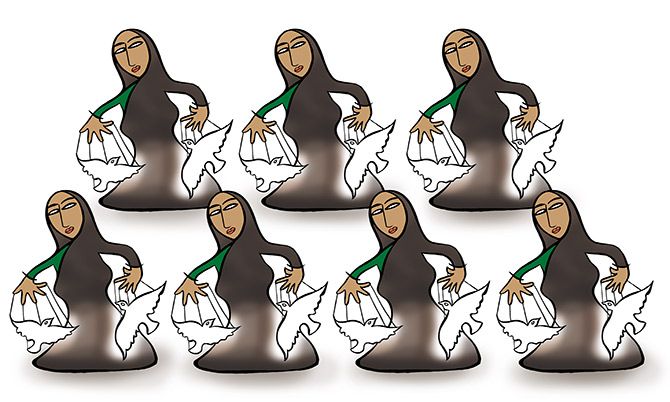A crafts NGO in New Delhi is giving wings to India's first all-women puppeteer group, discovers Geetanjali Krishna.
Illustration: Uttam Ghosh/Rediff.com

The women of Kathputli Colony in Delhi are weaving new folk tales these days. They tell stories of girls who rescue their fathers from peril. Of witches who turn out to have golden hearts. And of modern-day children who teach their mothers how to recycle waste.
"All the stories traditionally told by our puppeteer community used to be about defenseless princesses being rescued by brave princes," says Ramwati Bhat.
But that was before women, who traditionally played only passive roles in puppeteering performances, took control of the strings. "After training with Happy Hands Foundation, where we learnt to make our own puppets and perform with them, we decided to script a change in the stories."
As the women laugh and chatter together on a rooftop in this neighbourhood of puppeteers, it is evident that they haven't simply written more contemporary stories -- as the first all-women puppeteer group in their traditional patriarchal community from Rajasthan's Nagore district, they're reinventing their roles in their families and community as well as reinventing their art form.
"We now plan to videotape our performances and make our own channel on YouTube," says a member.
These ladies don't realise it but they've essentially echoed the core philosophy of HHF, a cheery young place where traditional artisans learn how to make their craft relevant in the modern context even as they learn to access wider markets.
"Our aim had always been to enable traditional crafts to come into normal use in society, instead of being archaic remnants of history that need to be preserved in museums," says Medhavi Gandhi, the dynamic young founder of HHF.
So, for instance, they've trained young Ajrakh printers to innovate their designs as well as dyes; enabled an Etikopakka toy maker from Andhra Pradesh to expand his business and helped several craft clusters across the country to jointly carve a niche for their products in the market.
In doing so, HHF is addressing a significant but oft-overlooked need.
Every year, more and more Indian craftsmen are abandoning their traditional livelihoods in lieu of modern, better-paid and more respected jobs. Not only are many Indian craftspeople far removed from their markets (and therefore dependent on middlemen) they also don't function together cohesively to improve the state of their craft.
"So many traditional craftspeople make the same designs for years. By learning to innovate a little, they can create a much larger market for themselves," says Gandhi.
S Chinniyachari, an Etikopakka wooden toymaker from Andhra Pradesh, participated in HHF's Cluster Development trainings.
"In our village, it was impossible for people to work together. Because of the pressure of manufacturers' orders, most artisans would supply at cheap rates, and some of us would be left out. Others would copy designs also," he says.
Post their training at HHF, artisans began marketing their products as a cluster. Chinniyachari, who used to work alone, now employs 22 people and has a retail showroom in Vizag.
HHF also organises regular art/craft residencies and social entrepreneurship development programmes in which young artisans interact with designers, marketing consultants and internet professionals.
At Kathputli Colony for example, the trainees have not only had the opportunity to learn different aspects of puppetry from experts, they've also learnt to balance their accounts, calculate prices and market their performances.
Although Gandhi is satisfied with how the Kathputli Colony project has shaped up (the ladies still have at least seven more months of training, mostly in marketing, left), she says it hasn't been easy going.
"Social attitudes towards women working were hard to change. When we found much of the opposition coming from grandmothers and mothers-in-law, we got them to join as well," she smiles.
The entrepreneurship programme at Kathputli Colony, sponsored by the British Council and Diageo, has benefited over fifty women and costs about Rs 3.5 lakh per year.
Meanwhile, the ladies at Kathputli Colony gather for practice on their teacher, Puran Bhat's, terrace. "We used to simply do housework and help our menfolk by sewing clothes for puppets," says Ramwati. "Now that we've got our own puppets and hopefully soon, our own businesses, I'm sure we'll get more respect in the community."
You can find out more about Happy Hands here.











